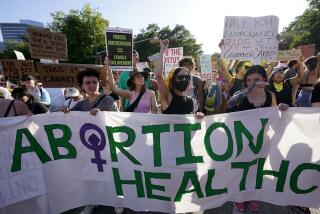Hoag’s underhanded abortion ban
In a most underhanded and insidious way, women’s reproductive health rights in California were dealt a significant blow last month. That was when the availability of elective abortions at Hoag Memorial Hospital Presbyterian, one of Orange County’s elite medical centers, was abruptly ended.
The ban on abortions was imposed by Hoag administrators effective May 1, shortly after the hospital entered a corporate partnership with St. Joseph Health System, a Roman Catholic chain with five hospitals in Orange County. The administrators acknowledge that the change was made at least in part as a response to St. Joseph’s “sensitivity” about abortion.
What’s worse, doctors at Newport Beach-based Hoag say the administration lied to them about the partnership deal. They were assured from the outset there would be no changes in the services they provide to their female patients. But public documents suggest that the abortion ban was planned by Hoag and St. Joseph as long ago as last fall.
Even worse: The entire arrangement was blessed by Atty. Gen. Kamala D. Harris, who has the legal authority to rule on any change like an abortion ban as a condition of her approving a major transaction involving California nonprofit medical institutions. She was aware that the merger partners were planning to end abortion services at Hoag. Unconscionably, she waved it through.
One more thing: The terms of her approval could allow Hoag to eliminate other reproductive services frowned on by Catholic healthcare doctrine when the state’s oversight of the deal expires, 10 years from now.
Harris’ approval of this deal may already be fraying at the edges. She is currently investigating unspecified allegations that Hoag has failed to meet the conditions she set on allowing the abortion ban. These include a requirement that Hoag “take steps to insure that alternative providers are available and accessible to all women, especially low-income women, for direct abortions” in Hoag’s service area, which stretches from Seal Beach to Dana Point and inland to Rancho Santa Margarita. The AG is also looking into allegations that the hospitals misrepresented statistics they provided her to make the number of abortions at Hoag seem insignificant. Hoag says it is “cooperating and responding to any and all AG inquiries” in the matter.
The result of all this is that the services OB/GYNs provide their patients at Hoag, a Presbyterian hospital, will be constrained not by medical resources, their medical judgments or the law, but by Catholic doctrine.
A woman’s right to choose an abortion is protected by the U.S. Constitution and guaranteed under California law. But that right has been eroded by state legislatures imposing restrictions on access, and by Catholic hospitals, which have a huge footprint in the American healthcare system.
Those faith-based hospitals receive billions of dollars in taxpayer support — reimbursements from Medicare and Medicaid and legal status that allows them to operate tax free and their donors to take a tax deduction. But instead of providing the full range of reproductive services, they limit them in accordance with the Ethical and Religious Directives of the Catholic Church. These include prohibitions or stringent limits on in vitro fertilization, abortion and many contraceptive practices.
The issue is important for all communities because Catholic hospitals now account for 15% of the nation’s total hospital beds, serving 1 in 6 patients. Their reach is expanding, as they enter into management affiliations with non-Catholic hospitals and move to impose their doctrinal rules on their partners.
Occasionally a government authority will push back against the trend. In 2011, for example, Kentucky Gov. Steve Beshear vetoed a proposed merger of two Louisville hospitals with a Catholic network because of concerns that the combination would reduce the availability of reproductive services. Harris chose a different path.
That’s the context for what has happened at Hoag.
The whole sorry story started Aug. 15, 2012, when Hoag and St. Joseph announced they were forming a partnership. Although Hoag and St. Joseph would be joined together as an entity called Covenant Health Network, the hospitals’ announcement promised that “Hoag and St. Joseph Health will retain their individual identities and faith affiliations — Presbyterian and Catholic, respectively.”
Despite that pledge, the news alarmed Hoag’s OB/GYN staff. During the fall, they asked administrators how their ability to provide reproductive services to patients would be affected by partnering with a Catholic hospital group. “We were told this wouldn’t affect care at Hoag in any way,” says Jeffrey Illeck, a Hoag OB/GYN. The doctors specifically inquired about abortion services. “We were repeatedly assured that there would be no change in these services at Hoag,” according to an open letter signed by Illeck and seven of his colleagues and published in the Orange County Daily Pilot.
But things did change at Hoag. In March, the administration informed doctors out of the blue that “elective abortions” would be banned at Hoag as of May 1. “We were blindsided,” Illeck told me.
Hoag officials concede that the doctors were told that “nothing would change.” Yet they maintain, bizarrely, that the assurance remains valid, even though the treatment options available to patients at Hoag very clearly have changed. How do they reconcile these two facts? Not too well.
When I asked Allyson M. Brooks, Hoag’s executive medical director of women’s health services, whether banning abortions was not a pretty sizable change, she replied with doublespeak. “Nothing has changed with the relationship of the physician with their patient or their referral patterns,” she said, “and nothing has changed for patients in terms of their access to the comprehensive reproductive services that are available.”
What especially infuriates the doctors is the transparently false claim by Hoag’s leadership that the abortion decision had nothing to do with pressure from St. Joseph.
In a statement published in May, Hoag Chief Executive Robert Braithwaite and Hoag Board Chairman Gary McKitterick contended that only about 100 elective abortions have been performed at Hoag in each of the last two years. They implied that Hoag’s doctors couldn’t meet the “requirement for clinical excellence” for abortions because they don’t provide the full array of necessary counseling and support services for patients.
The doctors dispute the figure of 100 abortions per year as too low, and take as an affront the suggestion that they aren’t at the top of their game because of its rarity. (Harris’ office is investigating the claim of bogus statistics.)
“What angers me the most is they made up this farcical explanation,” says Merle Robboy, a veteran Hoag OB/GYN. “They claimed M.D.s don’t do counseling — I’ve been doing this for 41 years, and I spend a lot of time counseling patients.”
The truth, as Braithwaite acknowledged to me and my colleague Anna Gorman in an interview, is that St. Joseph’s unhappiness with abortions at Hoag emerged early in the partnership talks. Braithwaite’s sugar-coated version is that during those talks “we recognized that there was sensitivity on the women’s reproductive health issue to our partner.” Consequently, around the end of last year the Hoag board undertook a “very comprehensive, clinically led evaluation process of women’s health services.”
The conclusion of that study, Braithwaite said, was that “the continuation of elective abortions at Hoag was not the optimal solution to maintain the highest-quality family planning services for women in our community.”
Braithwaite seems to consider it something of a victory that Hoag managed to preserve the right to keep performing sterilizations and offer contraceptive consultations and other reproductive health services that “are not typically found inside Catholic hospitals.”
His point appears to be that Hoag sacrificed abortions to St. Joseph in order to keep doing the rest — as though Hoag had no choice but to capitulate, if only partially, to Catholic practice. Does that amount to St. Joseph pressuring Hoag to end abortions? Of course it does.
Harris’ Feb. 8 statement approving the deal, and a December 2012 report by a consultant she hired to examine the proposal, both acknowledge that abortions would be ended at Hoag under the terms of the deal. No such provision appears in the text of the Oct. 15 affiliation agreement that Covenant provided to me, but according to the attorney general’s office that’s not the complete document. In any case, Richard Afable, who negotiated the agreement as Hoag CEO and subsequently became CEO of Covenant and a St. Joseph executive, made it plain in an interview that ending Hoag’s “direct abortions” — the Catholic term for terminating a pregnancy by destroying a developing fetus any time after conception — was a fundamental condition for St. Joseph.
Speaking for St. Joseph, where he is now an executive vice president, he said that adherence to the institution’s own ban on abortions was “sacrosanct … required of ourselves and anyone that we [St. Joseph] would work with.”
That implies that Hoag’s “evaluation” of its women’s services was window-dressing designed to validate an agreement already reached between the partners.
The legal standard governing Harris’ authority to reject a hospital transaction requires her to find that it would “significantly” erode the availability or accessibility of healthcare in the community. Defining “significant” is a judgment call, but it’s hard to see how Hoag’s abortion ban fails to qualify.
Unlike women living in areas where abortion rights are under full-scale assault and where there may be a lone abortion clinic for hundreds of miles around, women in Orange County obviously don’t lack for options for reproductive healthcare. But that doesn’t mean Hoag’s action is not “significant.”
The Hoag and St. Joseph affiliation aims to serve fully one-third of Orange County’s 3 million residents. Hoag has the highest market share in obstetrics of any hospital in its area, at 26%. The seven partnering hospitals are linchpins of charity and community care in the county. That’s a significant chunk of healthcare capacity closed to women seeking a legal medical procedure.
There’s no evidence that Harris considered the basic complications that arise when any medical treatment is compromised by non-medical considerations, especially when they’re suddenly imposed on a facility boasting a tradition of full-service healthcare dating to 1952. Hoag physicians are wrestling with these complexities already, with little guidance from the administration.
For example, Catholic doctrine allows abortions under some conditions where the mother’s life is at stake — but “who’s going to decide if it’s for the health of the mother?” asks Illeck.
In oncology, doctors and patients sometimes choose to terminate a pregnancy because it can compromise the effectiveness of cancer treatment. “For me to say, ‘My hospital won’t allow that’ makes a bad situation so much worse,” says Lisa Abaid, a gynecological oncologist at Hoag and a signer of the open letter. “It would be a terrible thing for me to say that I can’t provide my patients a safe and legal and simple procedure.”
One impression that comes across from talking with Hoag executives is their disdain for such concerns. Their position is that this partnership is a business arrangement that will benefit all healthcare users in Orange County, and if the doctors aren’t down with that, tough. Brooks says, “When strategic decisions are made at the level of an organization and their vision and their mission … they don’t go to physicians and their at-will medical staff to ask their permission.”
That mindset explains how Hoag’s administrators could assure their doctors that “nothing would change” even though a controversial change was preordained, and why the doctors weren’t kept in the loop as the new policy developed.
And it surely raises the question of what other women’s services might be getting lopped off at Hoag in the future, for the sake of a religion-based restriction masquerading as a “strategic decision.”
Michael Hiltzik’s column appears Sundays and Wednesdays. Reach him at mhiltzik@latimes.com, read past columns at latimes.com/hiltzik, check out facebook.com/hiltzik and follow @hiltzikm on Twitter.







